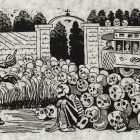The Best Poem I Read This Month: Cortney Lamar Charleston’s “I’m Not a Racist”
 Cortney Lamar Charleston’s “I’m Not a Racist,” published in One Throne Magazine, is an all-too-relevant rendering of “fair and balanced” evil. The poem, organized in couplets and single-standing lines, presents a mash-up of thoughts from a speaker who claims “I’m not a racist / I’m a realist,” in order to uproot the twisted anti-logic that has led to the deaths of Tamir Rice, Sandra Bland, and too many people of color.
Cortney Lamar Charleston’s “I’m Not a Racist,” published in One Throne Magazine, is an all-too-relevant rendering of “fair and balanced” evil. The poem, organized in couplets and single-standing lines, presents a mash-up of thoughts from a speaker who claims “I’m not a racist / I’m a realist,” in order to uproot the twisted anti-logic that has led to the deaths of Tamir Rice, Sandra Bland, and too many people of color.
“I’m Not a Racist” is all voice, all “but I see it this way” opinion. Charleston’s method begins by mimicking a “stand your ground” shooter, and then moves into the voices of a politician, a Yale-graduate, and a “well-meaning” white liberal. At several points in the poem, the voices almost “tip the scale” into a forthright opinion, but then tiptoe back into “comfortable” zones. All references and topics discussed within the poem are “seemingly” ambiguous, while, in fact, they represent racist realities. The word “race” is crossed out in stanza 13, as if the word, or even the thought of the word, simply reflects a mistake. This “mistake” is counterbalanced by a gesture towards “fairness” in the use of language, wherein one of the white voices asks: “if they can say it, then why can’t I?”
While the initial effect of the poem comes off as a whirlwind of insidious racist remarks, the poem ends on the line “looking at the body splayed before me.” Charleston, by placing this image in its own stanza at the poem’s close, forefronts the real, the actual, the apparent, and the physical. Although one of the white voices still views that body in relation to himself – “before me” – the speaker displays an awareness of his white and violent positioning. In this linear arrangement, it’s as if Charleston is claiming, “For all the words used, there are still black people being murdered.” Or, Charleston’s poem might be saying, “Because of all the ‘well-meaning’ and ‘fair and balanced’ words used, there are still black people being murdered.” Notice, too, how there are no voices of people of color in the poem; only whiteness speaks, and, like a horrific newsreel, there are images of black bodies with no chance to say anything.
A disturbing aspect of the acts of police brutality in the past year is how much rhetoric played a role. As if people could forget about unarmed black men being killed because they heard someone’s “opinion” – whether that’s a ruling, an opinion piece, or a poem. Ultimately, these tricks of language never point towards reality; instead, we come back to the person speaking: “but I’m not a racist,” “but I have a black friend,” “but I don’t see race,” etc. Acknowledging one’s position is important; however, the lie of whiteness acts in a way in which “whiteness” is not named yet remains central. Charleston’s chilling poem pushes the first-person pronouns forward. These “I’s” remind us that the centrality of white egos have and will destroy whatever crosses its path. The poem asks if we are “simply moving to the other side,” or if we will actually name and change our actions.



